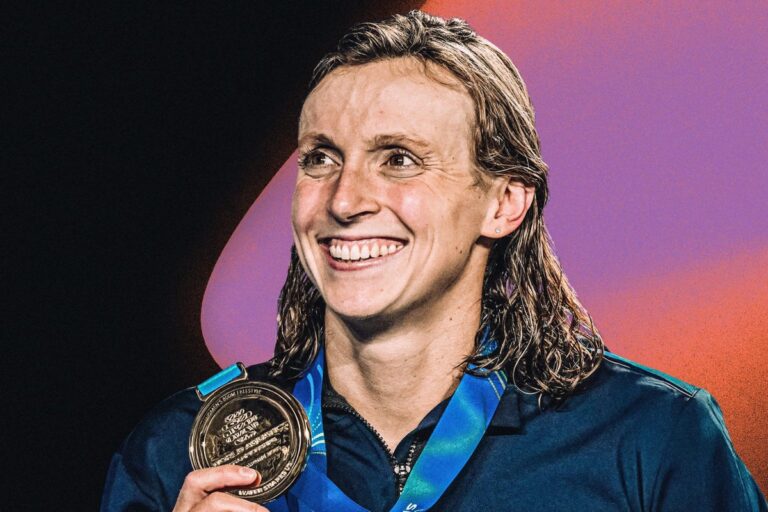Editor’s Note: This story is part of Peak, The Athletic’s desk covering leadership, personal development and performance through the lens of sports. Follow Peak here.
When I was younger, I wanted so badly to be a good swimmer. I went to all the clinics, swam year-round with hardly any breaks and even joined a CrossFit gym for two years to see if that would transfer to the pool.
But what always gave me the biggest sense of comfort were the older swimmers. I took note of what they did and how they thought, and even wrote letters to a few of them. (Some, like Katie Hoff, wrote me back.)
Once I got a little older, a new name popped up at my swim practices: Katie Ledecky. She was only a few years older than me, and when I watched videos of her race, I was amazed. She seemed so calm. Maybe that was because I was notoriously a wreck before races. I could never control my nerves.
For that reason, I always wanted to hear what she said during interviews, secretly hoping to pick up a tip or two.
So I was excited to watch her give the commencement speech at Stanford University in June, where she talked about some of these same ideas, and even more excited to speak to her myself.
I watched your Stanford commencement speech. The way you talked about goals and how you view them clicked for me. Especially as someone who used to always keep a goal list growing up. You explained you need to have goals, but they are never about winning, like wanting to win a specific race. Because then that makes it about comparison. How did that idea, over time, frame your mindset in training and influence the moments before big races?
It goes way back to when I first started swimming. For some reason I came up with this name for my goals. I would call them “want times.” And I would write out my “want time” before every meet. I just thought it was kind of a special thing when I had the special name for them.
They’re not goal times, they’re want times.
I always really loved the fact that swimming is based on time. You can really quantify your progress and see your progress. I would look at them after my meet and I would calculate the time that I beat the “want time” by or how far off I was from that goal. And I would save that piece of paper for the next meet.
I understood from a pretty young age that you can’t control what the other swimmers in the race are going to do. So all you can do is set a time goal for yourself and try to reach it. I think that focus has really allowed me, going into the big competitions, to stay focused on my own lane and not get caught up in what other people are doing or how they might take their race.
Were there ever any moments it was challenging to keep that same focus once you got older and all of the bigger meets and pressure were added in?
There have been moments where it’s challenging. Especially when I went on the streak.
(Ledecky has won the 800 free world title a record-breaking seven times and won the event at four straight Olympic Games. She has also led the world rankings in the event for 14 consecutive years, the longest streak in swimming history.)
At a certain point, you do start thinking about trying to keep up that record and you start thinking about medals at certain points. But I think I always come back to those times instead.
I really love the training. That always brings me back to that focus. It’s not just about trying to improve times in competitions. It’s about trying to improve times in practice as well. And I think once you start doing that and seeing improvement in training, you gain confidence that you can do some of that in meets as well.
Speaking of loving the training, I was actually talking to former Stanford women’s basketball coach Tara VanderVeer a while ago.
She is the best!
She is! And she was saying she got to swim with you.
Oh yeah, there was a good stretch that she was just in the pool at the same time as us several mornings a week.
That’s so funny. But she said when she was there for the first time, it was very apparent to her how genuinely excited you were about hard training. And that’s not natural for everybody. I don’t know if it’s something you can teach someone, but you’re saying you think a lot of it comes from your goals?
I love being around my team, being around my coaches, and knowing that they have goals that they’re working toward. Even though our goals can be different times, we’re all trying to achieve big things, especially with some of the swimmers that I train with on a regular basis.
I think having people around you who share that mindset is always valuable.
In college, I swam for Jake Shrum, who coaches at UVA now, so some of those girls he trains have been around you for a while. I actually have a text from one of the girls he trains, Claire Curzan, that I want to read to you.
“One thing I found is Katie is a very down-to-earth person, and you can see that in her leadership. On my first trip with her in 2021 she knew all of the rookies’ names and came up to us individually and introduced herself, which was the coolest ever. She is also always down to answer questions that I throw at her swimming/mentality-wise and it’s cool to be able to pick her brain. She’s always super excited to cheer in the stands and is your #1 fan in the team section if she sees you getting ready for a race! I could keep going. I’m the biggest Katie Ledecky fan ever.”
Who was this person for you growing up?
I always think back to when I was the rookie on the team. I was a pretty young rookie. I was 15 on my first international trip and it was the Olympics! So it was a big one. And I was on a team with a lot of the swimmers I looked up to for so many years.
I remember how meaningful it was to me for them to sit with me at breakfast or sit with me at meals. The littlest things had such an impact on me.
I remember (training) in the hotel gym once and one of the swimmers on the team offered to pass me the medicine ball. Like, be my partner. And he didn’t have to do that. That wasn’t part of his dryland exercises, but he offered to do that. And that meant so much to me.
I was in London Olympic Village with people like Dana Vollmer and Rebecca Soni and Missy Franklin. They just always looked out for me and kept one eye on me the whole time. That just meant the world to me, that they were going about their process and getting ready for their races, but they wanted to make sure that I felt like I belonged at that level.
I think it’s always been important for me to return that, now that I’m one of the veterans on the team. I want to always keep one eye on the rookies and make sure that they feel like they belong and make sure they feel comfortable, make sure that they feel ready for their races and make sure they feel really supported.
I feel like sometimes there are still chances to learn things in conversations with someone younger.
The energy that they bring to the team is just as impactful, if not more impactful than the energy and the wisdom, if you want to call it that, that the veterans can bring. It’s always fun to see the fresh excitement that they have. Small things like when they get to wear the USA flag caps for the first time, or just learning the ins and outs of an international swim meet, or even just the questions that they might ask me that I wouldn’t have thought of.
I learn something new every year.
Can you actually think of one of the things you learned or one of those questions they asked you that caused you to look at things from a different perspective?
It can be as simple as asking me about my warm-up routine at an international competition. Or I get the question of, “Katie you’ve been doing this a long time, do you have any advice for me on how I can continue to stay at this level? How do I go from this performance this year to doing it again next year?” And those questions help me reflect on my career.
It’s kind of a pinch-me moment whenever I get asked that question because I have been doing this a long time. Much longer than I ever would have imagined at this level. So I love having those conversations, and I hope that some of the things I pass on will make an impact on their future.
Is there something you make sure to tell them?
I think balance is really important. Not getting too consumed in swimming and maintaining all of your other interests and your other passions as well. I think when you get to a certain level, you might have this initial thought that you have to go all in and only focus on that. But it’s really important to maintain good balance.
Go to school, get your education, enjoy playing the instrument that you played growing up. All those little things that you love to do, don’t just throw those to the side. Continue doing those things that got you to that point. That’s one of the big things.
And then the other thing is to trust your coaches. That’s something that I’ve always tried to do, and I’ve had really great coaches over the years. I mean, you talk about leadership.
One thing coach (Anthony) Nesty always talks about is improvement, whether that’s improvement in training or improvement in meets or improvement with technique. If you can just focus on trying to get a little bit better each day, you’re going to enjoy the sport and you’re going to enjoy the process.
(Illustration: Dan Goldfarb / The Athletic; Manan Vatsyayana / AFP / Getty Images)


